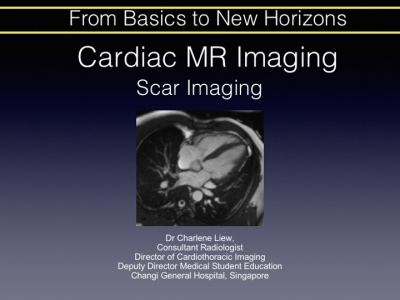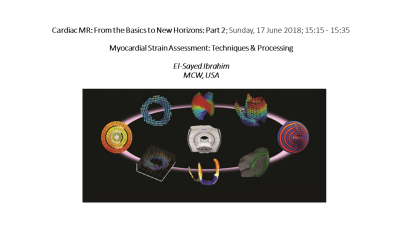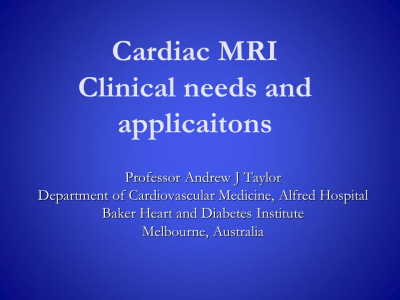|
Weekend Educational Course
Cardiac MR: From the Basics to New Horizons |
|
Cardiac MR: From the Basics to New Horizons: Part 1 (SAM Available)
Weekend Course
ORGANIZERS: Sebastian Kozerke, Reza Nezafat, Bernd Wintersperger
Sunday, 17 June 2018
| S01 |
13:15 - 14:35 |
Moderators: Daniel Herzka, Peng Hu |
Skill Level: Basic
Session Number: WE-21A
Overview
This course will review the essentials for any cardiac exam and then provide an overview of the clinical needs, technical foundations, and research promises focused on evaluating cardiac function, perfusion, and viability.
Target Audience
Attendees who have an emerging interest and want to develop a working knowledge of cardiac MRI and gain an in-depth perspective on the technical foundations in order to improve clinical diagnostics or advance research in cardiac function, perfusion, and viability imaging.
Educational Objectives
As a result of attending this course, participants should be able to:
-Identify the appropriate solutions to meet the clinical needs of cardiac imaging in: a) heart failure, b) ischemic heart disease, c) non-ischemic heart disease;
-Recognize the clinical indications and assess emerging techniques for cardiac perfusion imaging in ischemic heart disease; and
-Appraise novel methods for cardiac viability imaging for non-ischemic heart disease.
| |
Basic Clinical Cardiac Exam: The Bread & Butter Module |
13:15
|
|
 Cardiac Function Cardiac Function
Pierre Croisille
|
13:35
|
|
 Myocardial Perfusion Myocardial Perfusion
Raymond Kwong
|
13:55
|
 |
 Scar Imaging Scar Imaging
Charlene Liew
Scar imaging is the backbone of viability quantification of post myocardial infarction scarring. There are also other important applications of scar imaging in various conditions apart from ischaemic cardiomyopathy. This session explores the fundamentals of scar imaging, from physical principles to anatomy and new paradigms. |
| 14:10 |
|
SAMs: Scar Tissue |
| |
Tissue Mechanics/Microstructure Module |
14:15
|
|
 Clinical Needs & Applications Clinical Needs & Applications
David Sosnovik
|
14:35
|
|
Break & Meet the Teachers |
|
| |
|
Cardiac MR: From the Basics to New Horizons: Part 2
Weekend Course
ORGANIZERS: Sebastian Kozerke, Reza Nezafat, Bernd Wintersperger
Sunday, 17 June 2018
| S01 |
15:15 - 16:55 |
Moderators: Daniel Herzka, Peng Hu |
Skill Level: Basic
Session Number: WE-21B
Overview
This course will review the essentials for any cardiac exam and then provide an overview of the clinical needs, technical foundations, and research promises focused on evaluating cardiac function, perfusion, and viability.
Target Audience
Attendees who have an emerging interest and want to develop a working knowledge of cardiac MRI and gain an in-depth perspective on the technical foundations in order to improve clinical diagnostics or advance research in cardiac function, perfusion, and viability imaging.
Educational Objectives
As a result of attending this course, participants should be able to:
-Identify the appropriate solutions to meet the clinical needs of cardiac imaging in: a) heart failure, b) ischemic heart disease, c) non-ischemic heart disease;
-Recognize the clinical indications and assess emerging techniques for cardiac perfusion imaging in ischemic heart disease; and
-Appraise novel methods for cardiac viability imaging for non-ischemic heart disease.
| |
Tissue Mechanics/Microstructure Module |
15:15
|
 |
 Myocardial Strain Assessment: Techniques & Processing Myocardial Strain Assessment: Techniques & Processing
El-Sayed Ibrahim
Different MRI techniques have been developed over the past 30 years for measuring heart mechanics and assessing regional cardiac function. These techniques include tagging with saturation bands, spatial modulation of magnetization (SPAMM), complementary SPAMM (CSPAMM)), harmonic-phase (HARP) analysis, strain-encoding (SENC), displacement-encoding with stimulated-echoes (DENSE), tissue phase-mapping (TPM), cine cardiac feature-tracking (FT), and magnetic resonance elastography (MRE). Further, the recent advancements in in vivo MRI diffusion tensor imaging (DTI) of the heart allowed for better understanding of the cardiac myofiber structure and its effect on the heart function. In this presentation, these techniques will be reviewed along with their clinical applications.
|
15:35
|
|
 Cardiac DTI: Techniques & Postprocessing Cardiac DTI: Techniques & Postprocessing
Andrew Scott
Diffusion tensor cardiovascular magnetic resonance is unique in noninvasively assessing cardiac microstructure. In this session we examine the acquisition and processing techniques used to overcome the difficulties in measuring microscopic diffusion while the heart is moving with the cardiac and respiratory cycles.
|
| |
Tissue Characterisation Module |
15:55
|
 |
 Clinical Needs & Applications Clinical Needs & Applications
Andrew Taylor
Cardiac magnetic resonance (CMR) Imaging is now an essential investigation in the management algorithm of many cardiac conditions. By providing highly accurate structural and functional information, as well as non-invasive tissue characterization, CMR can improve both diagnostic accuracy and quantification of disease severity, leading to more effective healthcare delivery. Evolving CMR techniques, such as those utilizing parametric mapping and 4-dimensional flow quantification, offer new mechanistic insights into disease processes and may ultimately drive the development of novel targets for intervention.
|
16:15
|
|
 T1/T1rho/MT Imaging: Principles & Techniques T1/T1rho/MT Imaging: Principles & Techniques
Walter Witschey
|
16:35
|
|
 T2/T2* Imaging: Principles & Techniques T2/T2* Imaging: Principles & Techniques
Rohan Dharmakumar
This presentation will aim to achieve three tasks: a) outline key cardiac MRI approaches used for T2 and T2* imaging;(b) describe the recent advances in T2 and T2* imaging; and (c) summarize the evolving T2- and T2*-based cardiac MRI-based biomarkers that are being actively studied for improving the clinical management of heart disease.
|
16:55
|
|
Adjournment & Meet the Teachers |
|
| Back |
| The International Society for Magnetic Resonance in Medicine is accredited by the Accreditation Council for Continuing Medical Education to provide continuing medical education for physicians. |




